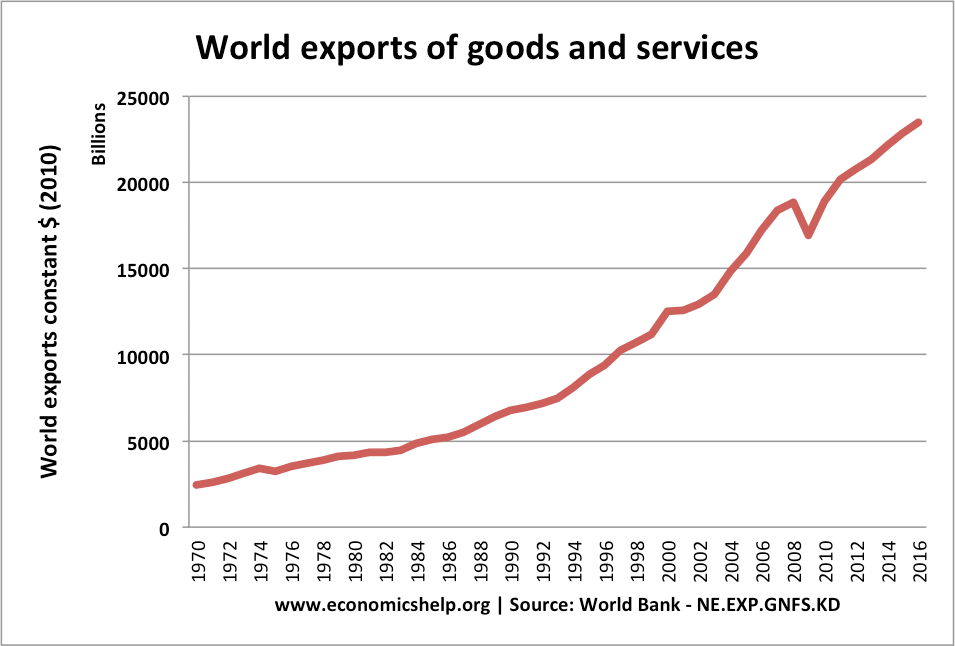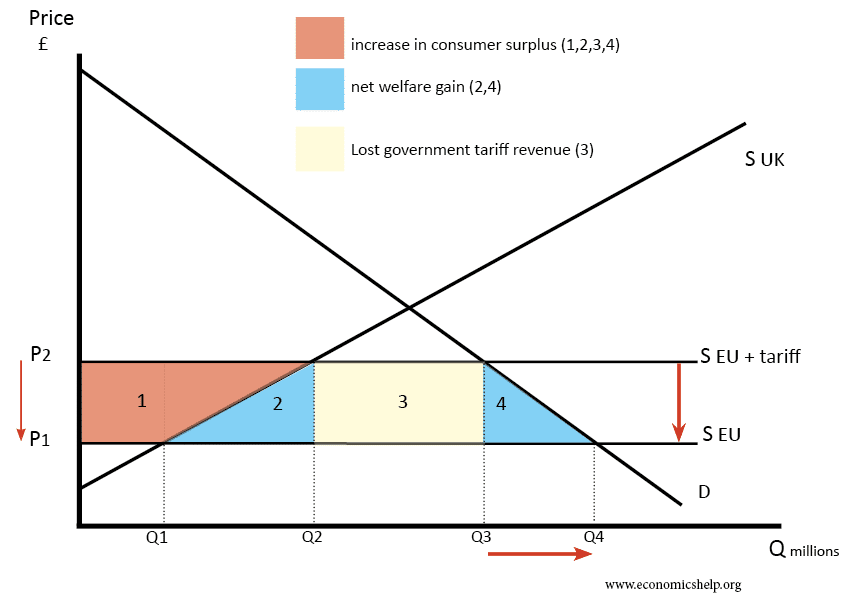Free trade means that countries can import and export goods without any tariff barriers or other non-tariff barriers to trade.
Essentially, free trade enables lower prices for consumers, increased exports, benefits from economies of scale and a greater choice of goods.
In more detail, the benefits of free trade include:
1. The theory of comparative advantage
This explains that by specialising in goods where countries have a lower opportunity cost, there can be an increase in economic welfare for all countries. Free trade enables countries to specialise in those goods where they have a comparative advantage.
2. Reducing tariff barriers leads to trade creation
Trade creation occurs when consumption switches from high-cost producers to low-cost producers.
- The removal of tariffs leads to lower prices for consumers (Prices fall from P1 to P2)
- This fall in prices enables an increase in consumer surplus of areas 1 + 2 + 3 + 4
- Imports will increase from Q3-Q2 to Q4-Q1
- The government will lose tax revenue of area 3. Tax revenue from imports was T (P1-P2) × (Q3-Q2)
- Domestic firms producing this good will sell less and lose producer surplus equal to area 1
- However, overall there will be an increase in economic welfare of 2+4 (1+2+3+4 – (1+3)
- The magnitude of this increase depends upon the elasticity of supply and demand. If demand elastic consumers will have a big increase in welfare
- Essentially, removing tariffs leads to lower prices for consumers – so the price of imported food, clothes and computers will be lower. When the UK joined the EEC – the price of many imports from Europe fell.
3. Increased exports
As well as benefits for consumers importing goods, firms exporting goods where the UK has a comparative advantage will also see a significant improvement in economic welfare. Lower tariffs on UK exports will enable a higher quantity of exports boosting UK jobs and economic growth.
4. Economies of scale
If countries can specialise in certain goods they can benefit from economies of scale and lower average costs; this is especially true in industries with high fixed costs or that require high levels of investment. The benefits of economies of scale will ultimately lead to lower prices for consumers and greater efficiency for exporting firms.
5. Increased competition
With more trade, domestic firms will face more competition from abroad. Therefore, there will be more incentives to cut costs and increase efficiency. It may prevent domestic monopolies from charging too high prices.
6. Trade is an engine of growth.
World trade has increased by an average of 7% since 1945, causing this to be one of the significant contributors to economic growth.

7. Make use of surplus raw materials
Middle Eastern countries such as Qatar are very rich in reserves of oil, but without trade, there would be not much benefit in having so much oil.
Japan, on the other hand, has very few raw materials; without trade, it would have low GDP.
8. Tariffs may encourage inefficiency
If an economy protects its domestic industry by increasing tariffs industries may not have any incentives to cut costs.
Economists on Free Trade
Adam Smith, The Wealth Of Nations (1776) Smith generally supported free trade arguing countries should specialise in their areas of expertise. He made the argument there is no point in protecting the Scottish wine industry if it would cost 30 times the price of importing wine from warmer countries. Smith also argued that if our competitors become better off, they will be able to buy more of our exports. Smith saw trade as a way for all countries to become better off. This was in contrast to the zero-sum Mercantilist theories popular at the time.
“As a rich man is likely to be a better customer to the industrious people in his neighbourhood than a poor, so is likewise a rich nation. [Trade restrictions,] by aiming at the impoverishment of all our neighbours, tend to render that very commerce insignificant and contemptible.”
The Wealth Of Nations, Book IV, Chapter III, Part II, p.495, para. c11.
“If a foreign country can supply us with a commodity cheaper than we ourselves can make it, better buy it of them with some part of the produce of our own industry, employed in a way in which we have some advantage.”
The Wealth Of Nations, Book IV, Chapter II, [link]
David Ricardo On the Principles of Political Economy and Taxation. (1817) Ricardo made case for free trade on the basis of comparative advantage. Ricardo tried to show that removal of tariffs would lead to a net welfare gain – the gain of consumers outweighing the loss of producers
“Under a system of perfectly free commerce, each country naturally devotes its capital and labour to such employments as are most beneficial to each. This pursuit of individual advantage is admirably connected with the universal good of the whole.”
David Ricardo, On the Principles of Political Economy and Taxation (link)
John Maynard Keynes. Keynes was generally free trade and supported the logic of specialisation
“In a regime of Free Trade and free economic intercourse it would be of little consequence that iron lay on one side of a political frontier, and labor, coal, and blast furnaces on the other. But as it is, men have devised ways to impoverish themselves and one another; and prefer collective animosities to individual happiness.”
John Maynard Keynes The Economic Consequences of the Peace (1920) Though it worth bearing in mind Keynes wavered on free trade in some circumstances
Greg Mankiw argues that free trade is one area where economists are united
“Few propositions command as much consensus among professional economists as that open world trade increases economic growth and raises living standards.” – Greg Mankiw [link]
Joseph Stiglitz is more circumspect. Stiglitz argues free trade depends on individual circumstances
The Economist
ECONOMISTS are usually accused of three sins: an inability to agree among themselves; stating the obvious; and giving bad advice. In the field of international trade, they would be right to plead not guilty to all three. If there is one proposition with which virtually all economists agree, it is that free trade is almost always better than protection. Yet the underlying theory is not readily understood by non-economists. And the advice that follows from it-protection does not pay-is seldom wrong.
From: Economist 1998
Related

